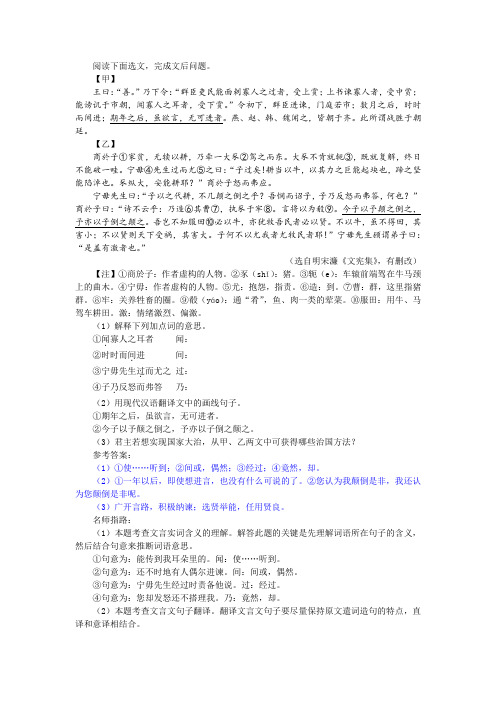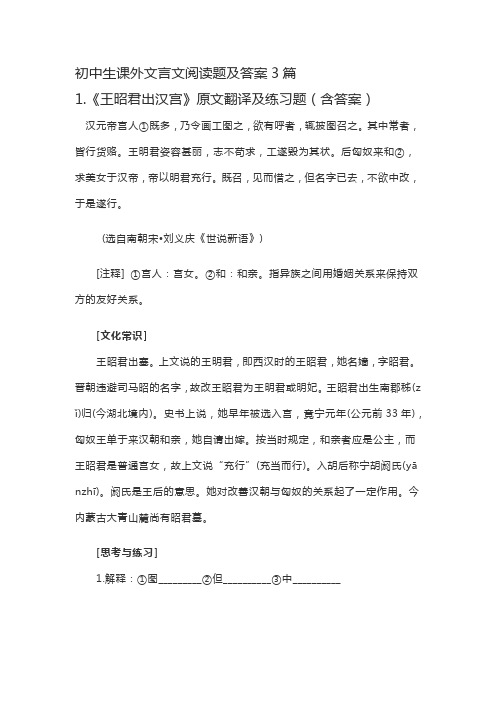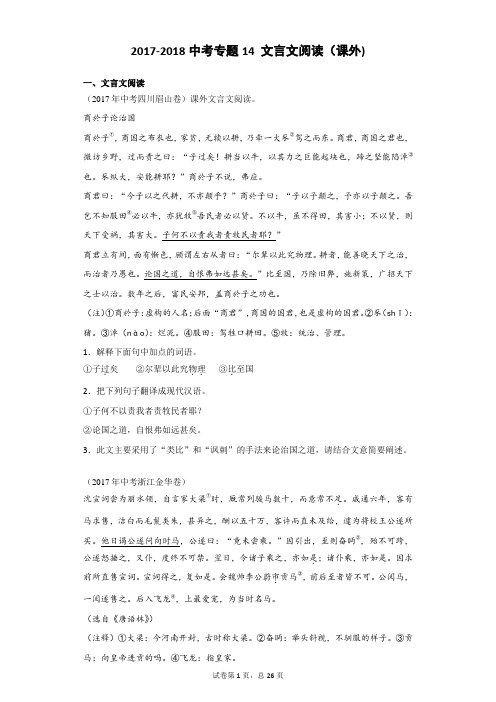宋濂《宋学士文集-商於子驾豕》中考初中阅读答案试题解析翻译译文
《邹忌讽齐王纳谏》宋濂《文宪集之商於子》阅读训练及答案参考译文

阅读下面选文,完成文后问题。
【甲】王曰:“善。
”乃下令:“群臣吏民能面刺寡人之过者,受上赏;上书谏寡人者,受中赏;能谤讥于市朝,闻寡人之耳者,受下赏。
”令初下,群臣进谏,门庭若市;数月之后,时时而间进;期年之后,虽欲言,无可进者。
燕、赵、韩、魏闻之,皆朝于齐。
此所谓战胜于朝廷。
【乙】商於子①家贫,无犊以耕,乃牵一大豕②驾之而东。
大豕不肯就轭③,既就复解,终日不能破一畦。
宁毋④先生过而尤⑤之曰:“子过矣!耕当以牛,以其力之巨能起块也,蹄之坚能陷淖也。
豕纵大,安能耕耶?”商於子怒而弗应。
宁毋先生曰:“子以之代耕,不几颠之倒之乎?吾悯而诏子,子乃反怒而弗答,何也?”商於子曰:“诗不云乎:乃造⑥其曹⑦,执豕于牢⑧。
言将以为殽⑨。
今子以予颠之倒之,予亦以子倒之颠之。
吾岂不知服田⑩必以牛,亦犹牧吾民者必以贤。
不以牛,虽不得田,其害小;不以贤则天下受祸,其害大。
子何不以尤我者尤牧民者耶!”宁毋先生顾谓弟子曰:“是盖有激者也。
”(选自明宋濂《文宪集》,有删改)【注】①商於子:作者虚构的人物。
②豕(shǐ):猪。
③轭(e):车辕前端驾在牛马颈上的曲木。
④宁毋:作者虚构的人物。
⑤尤:抱怨,指责。
⑥造:到。
⑦曹:群,这里指猪群。
⑧牢:关养牲畜的圈。
⑨殽(yáo):通“肴”,鱼、肉一类的荤菜。
⑩服田:用牛、马驾车耕田。
激:情绪激烈、偏激。
(1)解释下列加点词的意思。
①闻.寡人之耳者闻:②时时而间.进间:③宁毋先生过.而尤之过:④子乃.反怒而弗答乃:(2)用现代汉语翻译文中的画线句子。
①期年之后,虽欲言,无可进者。
②今子以予颠之倒之,予亦以子倒之颠之。
(3)君主若想实现国家大治,从甲、乙两文中可获得哪些治国方法?参考答案:(1)①使……听到;②间或,偶然;③经过;④竟然,却。
(2)①一年以后,即使想进言,也没有什么可说的了。
②您认为我颠倒是非,我还认为您颠倒是非呢。
(3)广开言路,积极纳谏;选贤举能,任用贤良。
初中生课外文言文阅读题及答案3篇

初中生课外文言文阅读题及答案3篇1.《王昭君出汉宫》原文翻译及练习题(含答案)汉元帝宫人①既多,乃令画工图之,欲有呼者,辄披图召之。
其中常者,皆行货赂。
王明君姿容甚丽,志不苟求,工遂毁为其状。
后匈奴来和②,求美女于汉帝,帝以明君充行。
既召,见而惜之,但名字已去,不欲中改,于是遂行。
(选自南朝宋•刘义庆《世说新语》)[注释] ①宫人:宫女。
②和:和亲。
指异族之间用婚姻关系来保持双方的友好关系。
[文化常识]王昭君出塞。
上文说的王明君,即西汉时的王昭君,她名嫱,字昭君。
晋朝违避司马昭的名字,故改王昭君为王明君或明妃。
王昭君出生南郡秭(z ǐ)归(今湖北境内)。
史书上说,她早年被选入宫,竟宁元年(公元前33年),匈奴王单于来汉朝和亲,她自请出嫁。
按当时规定,和亲者应是公主,而王昭君是普通宫女,故上文说“充行”(充当而行)。
入胡后称宁胡阏氏(yānzhī)。
阏氏是王后的意思。
她对改善汉朝与匈奴的关系起了一定作用。
今内蒙古大青山麓尚有昭君墓。
[思考与练习]1.解释:①图_________②但__________③中__________2.翻译:欲有呼者,辄披图召之____________________________________________;3.理解:“其中常者,皆行货赂”中“常者”指________________________;“常者”向_________________货赂。
4.理解:“但名字已去”中的“去”,应理解为________________________________【译文】汉元帝后宫宫女很多,就让画工描绘下她们的相貌,元帝想找哪个宫女,就翻阅图像召唤。
宫女中姿色平庸的,都向画工行贿。
王明君容貌姿态非常美丽,但她不肯苟且求画工,画工就把她的容貌画得很难看。
后来,匈奴前来和亲,向汉元帝请求赏赐美女,元帝就让王明君充当出行。
召见以后,看到她那么美丽,又舍不得了。
但是王明君的名字已经送往匈奴,不好中途更改,于是王明君就去了。
初二文言文课外阅读及答案:宋学士文集

初二文言文课外阅读及答案:宋学士文集(学习版)编制人:__________________审核人:__________________审批人:__________________编制学校:__________________编制时间:____年____月____日序言下载提示:该文档是本店铺精心编制而成的,希望大家下载后,能够帮助大家解决实际问题。
文档下载后可定制修改,请根据实际需要进行调整和使用,谢谢!并且,本店铺为大家提供各种类型的教育资料,如语文资料、数学资料、英语资料、物理资料、化学资料、地理资料、政治资料、历史资料、艺术资料、其他资料等等,想了解不同资料格式和写法,敬请关注!Download tips: This document is carefully compiled by this editor.I hope that after you download it, it can help you solve practical problems. The document can be customized and modified after downloading, please adjust and use it according to actual needs, thank you!In addition, this shop provides various types of educational materials for everyone, such as language materials, mathematics materials, English materials, physical materials, chemical materials, geographic materials, political materials, historical materials, art materials, other materials, etc. Please pay attention to the data format and writing method!初二文言文课外阅读及答案:宋学士文集初二文言文课外阅读及答案:宋学士文集(六)王冕僧寺夜读《宋学士文集》【原文】王冕者,诸暨人。
2018-2019中考专题14 文言文阅读(课外)

2017-2018中考专题14 文言文阅读(课外)一、文言文阅读(2017年中考四川眉山卷)课外文言文阅读。
商於子论治国商於子①,商国之布衣也,家贫,无犊以耕,乃牵一大豕②驾之而东。
商君,商国之君也,微访乡野,过而责之曰:“子过矣!耕当以牛,以其力之巨能起块也,蹄之坚能陷淖③也。
豕纵大,安能耕耶?”商於子不说,弗应。
商君曰:“今子以之代耕,不亦颠乎?”商於子曰:“子以予颠之,予亦以子颠之。
吾岂不知服田④必以牛,亦犹牧⑤吾民者必以贤。
不以牛,虽不得田,其害小;不以贤,则天下受祸,其害大。
子何不以责我者责牧民者耶?”商君立有间,面有惭色,顾谓左右从者曰:“尔辈以此究物理。
耕者,能善晓天下之治,而治者乃愚也。
论国之道,自恨弗如远甚矣。
”比至国,乃除旧弊,施新策,广招天下之士以治。
数年之后,富民安邦,盖商於子之功也。
(注)①商於子:虚构的人名;后面“商君”,商国的国君,也是虚构的国君。
②豕(shǐ):猪。
③淖(nào):烂泥。
④服田:驾牲口耕田。
⑤牧:统治、管理。
1.解释下面句中加点的词语。
①子过.矣②尔辈以此究物理..③比.至国2.把下列句子翻译成现代汉语。
①子何不以责我者责牧民者耶?②论国之道,自恨弗如远甚矣。
3.此文主要采用了“类比”和“讽刺”的手法来论治国之道,请结合文意简要阐述。
(2017年中考浙江金华卷)沈宣词尝为丽水领,自言家大梁①时,厩常列骏马数十,而意常不足.。
咸通六年,客有马求售,洁白而毛鬣类朱,甚异之,酬以五十万,客许而直未及给,遽为将校王公遂所买。
他日谒公遂问向时马,公遂曰:“竟未尝乘。
”因引出,至则奋眄②,殆不可跨,公遂怒捶之,又仆,度终不可禁。
翌日,令诸子乘之,亦如是.;诸仆乘,亦如是。
因求前所直售宣词。
宣词得之,复如是。
会魏帅李公蔚市.贡马③,前后至者皆不可。
公阅马,一阅遂售之。
后入飞龙④,上最爱宠,为当时名马。
(选自《唐语林》)(注释)①大梁:今河南开封,古时称大梁。
《商於子驾豕》

《商於子驾豕》原文:商於子家贫,无犊以耕,乃牵一大豕驾之而东。
大豕不肯就轭,既就复解,终日不能破一畦。
宁毋先生过而尤之曰:“子过矣!耕当以牛,以其力之巨能起块也,蹄之坚能陷淖也。
豕纵大,安能耕耶?”商於子怒而弗应。
宁毋先生曰:“子以之代耕,不几颠之倒之乎?吾悯而诏子,子乃反怒而弗答,何也?”商於子曰:“子以予颠之倒之,予亦以子倒之颠之。
吾岂不知服田⒇必以牛,亦犹牧吾民者必以贤。
不以牛,虽不得田,其害小;不以贤则天下受祸,其害大。
子何不以尤我者尤牧民者耶?”宁毋先生顾谓弟子曰:“是盖有激者也。
”(选自明·宋濂《宋学士文集》)译文:商於子家很贫穷,又没有牛耕田,他就牵一头大猪自西向东耕田。
大猪不肯被套上轭,一套上又被挣脱,一天也不能耕一小块田。
宁毋先生经过时责备他说:“你错啦!耕地应当用牛,凭借牛巨大的力气能够使土块耕起,凭借牛坚硬有力的蹄子可以站立于泥淖之中。
猪再大,怎么能耕地呢?”商於子怒目而视但没搭理他。
宁毋子先生说:“如今您用猪来代牛耕地,不是差不多弄颠倒了吗?我同情你才告诉你,您却发怒还不搭理我,是为什么啊?”商於子说:“您认为我颠倒是非,我还认为您颠倒是非呢。
我难道不知道侍弄田地必须用牛,也就如同治理百姓必须用贤人一样。
不用牛,虽然侍弄不好田地,它的害处小;不用贤人,那么天下遭受祸害,它的害处大。
您怎么不用责备我的话去责备治理百姓的人啊?”宁毋先生回头对弟子说:“这原来是对现实有不平之气的人。
”注释:1、商於(wū)子:作者虚构的人物。
2、犊:小牛。
3、以:用。
4、乃:于是,就。
5、豕(shǐ):猪。
6、轭(è):牛拉东西时驾在颈上的曲木。
7、宁毋:作者虚构的人物。
8、尤:责备。
9、过:犯错(此时为动词)。
10、当:应当。
11、以:用。
12、以:凭借。
13、其:代(牛的)。
14、之:结构助词,的。
15、淖(nào):烂泥。
16、以:用。
17、几:差不多,几乎。
[商於子驾豕]《商於子驾豕》译文注释翻译及阅读答案
![[商於子驾豕]《商於子驾豕》译文注释翻译及阅读答案](https://img.taocdn.com/s3/m/99f8390b1ed9ad51f11df239.png)
[商於子驾豕]《商於子驾豕》译文注释翻译及阅读答案导读:这是一篇讽喻性小品文。
作者借古喻今,把朝廷任用无德无才的用人充当地方官吏比作是驾驭猪耕田,形象生动地抨击了统治者不用贤人这一社会问题。
商於子驾豕原文商於子家贫,无犊以耕,乃牵一大豕驾之而东。
大豕不肯就轭,既就复解:终日不能破一畦。
宁毋先④生过而尤之日:子过矣!耕当以牛,以其力之巨能起块也,蹄之坚能陷淖也。
豕纵大,安能耕耶?商於子怒而弗应。
宁毋先生日:今子以之代耕,不几颠之倒之乎?吾悯而诏子,子乃反怒而弗答,何也?商於子日:子以予颠之倒之,予亦以子倒之颠之。
吾岂不知服田必以牛,亦犹牧吾民者必以贤。
不以牛,虽不得田,其害小;不以贤则天下受祸,其害大。
子何不以尤我者尤牧民者耶?宁毋先生顾谓弟子日:是盖有激者也。
(选自明·宋濂《宋学士文集》)注释1、商於(wū)子:作者虚构的人物。
2、犊:小牛。
3、以:用。
4、乃:于是,就。
5、豕(shǐ):猪。
6、轭(è):牛拉东西时驾在颈上的曲木。
7、宁毋:作者虚构的人物。
8、尤:责备。
9、过:犯错(此时为动词)。
10、当:应当。
11、以:用。
12、以:凭借。
13、其:代(牛的)。
14、之:结构助词,的。
15、淖(nào):烂泥。
16、以:用。
17、几:差不多,几乎。
18、诏:告诉,告诫。
19、以,:以为,认为。
20、服田:驾牲口耕田。
21、犹:如同。
22、牧:统治、管理。
23、以:以为,认为。
24、以:用。
25、顾:回头看。
26、有激者:(心中)有不平之气的人。
文言知识:上文“子以予颠之倒之”中的“以”,作动词用,解为“认为”。
有时“以”与“为”组合成“以为”或“以……为”,也解为“认为”。
上文“必以贤”中的“以”,解为“任用”,也作动词用。
上文“无犊以耕”中的“以”,作连词用; “子何不以尤我者尤牧民者耶”中的“以”,作介词用,解为“把”。
译文:商於子家很贫穷,又没有牛耕田,他就牵一头大猪自西向东耕田。
【备战2014】中考语文 课外文言文专练 商於子驾豕
商於子驾豕一畦。
宁毋先④生过而尤之日:“子过矣!耕当以牛,以其力之巨能起块也,蹄之坚能陷淖⑤也。
豕纵大,安能耕耶?”商於子怒而弗应。
宁毋先生日:“今子以之代耕,不几颠之倒之乎?吾悯而诏子,子乃反怒而弗答,何也?”商於子日:“子以予颠之倒之,予亦以子倒之颠之。
吾岂不知服田⑥必以牛,亦犹牧⑦吾民者必以贤。
不以牛,虽不得田,其害小;不以贤则天下受祸,其害大。
子何不以尤我者尤牧民者耶?”宁毋先生顾谓弟子日:“是盖有激者⑧也。
”(选自明•宋濂《宋学士文集》)[注释] ①商於(wù)子:作者虚构的人物。
②豕(s h ǐ):同“猪”。
③轭(è):牛拉东西时驾在颈上的曲木。
④宁毋:作者虚构的人物。
⑤淖(nào):烂泥。
⑥服田:驾牲口耕田。
⑦牧:统治、管理。
⑧有激者:(心中)有不平之气的人。
[文言知识]之倒之”中的“以”,作动词用,解为“认为”。
有时“以”与“为”组合成“以为”或“以……为”,也解为“认为”。
上文“必以贤”中的“以”,解为“任用”,也作动词用。
又,上文“无犊以耕”中的“以”,作连词用;又,“子何不以尤我者尤牧民者耶”中的“以”,作介词用,解为“把”。
[思考与练习]1.解释:①犊_________②尤__________③过___________________⑤几_________⑥顾_________⑦盖_________2.翻译:①既就复解,终曰不能破一畦者耶?________________________________;_____________________________________________;③子何不以尤我者尤牧民者耶?_______________________________________________________________ 3.理解:本文的主题思想是____________________________________________________商於子家很贫穷没有牛耕田,就牵一头大猪日出而作。
商於子驾豕原文及翻译古籍
商於子驾豕原文及翻译古籍商於子驾豕原文及翻译古籍《商於子驾豕》是被明太祖朱元璋誉为“开国文臣之首”的宋濂的作品。
本书是一篇讽喻性小品文。
作者借古喻今,把朝廷任用无德无才的用人充当地方官吏比作是驾驭猪耕田,形象生动地抨击了统治者不用贤人这一社会问题。
原文:商於子家贫,无犊以耕,乃牵一大豕驾之而东。
大豕不肯就轭,既就复解,终日不能破一畦。
宁毋先生过而尤之曰:“子过矣!耕当以牛,以其力之巨能起块也,蹄之坚能陷淖也。
豕纵大,安能耕耶?”商於子怒而弗应。
宁毋先生曰:“子以之代耕,不几颠之倒之乎?吾悯而诏子,子乃反怒而弗答,何也?”商於子曰:“子以予颠之倒之,予亦以子倒之颠之。
吾岂不知服田⒇必以牛,亦犹牧吾民者必以贤。
不以牛,虽不得田,其害小;不以贤则天下受祸,其害大。
子何不以尤我者尤牧民者耶?”宁毋先生顾谓弟子曰:“是盖有激者也。
” (选自明?宋濂《宋学士文集》)译文:商於子家很贫穷,又没有牛耕田,他就牵一头大猪自西向东耕田。
大猪不肯被套上轭,一套上又被挣脱,一天也不能耕一小块田。
宁毋先生经过时责备他说:“你错啦!耕地应当用牛,凭借牛巨大的力气能够使土块耕起,凭借牛坚硬有力的蹄子可以站立于泥淖之中。
猪再大,怎么能耕地呢?”商於子怒目而视但没搭理他。
宁毋子先生说:“如今您用猪来代牛耕地,不是差不多弄颠倒了吗?我同情你才告诉你,您却发怒还不搭理我,是为什么啊?”商於子说:“您认为我颠倒是非,我还认为您颠倒是非呢。
我难道不知道侍弄田地必须用牛,也就如同治理百姓必须用贤人一样。
不用牛,虽然侍弄不好田地,它的害处小;不用贤人,那么天下遭受祸害,它的害处大。
您怎么不用责备我的话去责备治理百姓的人啊?”宁毋先生回头对弟子说:“这原来是对现实有不平之气的人。
”注释:1、商於(wū)子:作者虚构的人物。
2、犊:小牛。
3、以:用。
4、乃:于是,就。
5、豕(shǐ):猪。
6、轭(è):牛拉东西时驾在颈上的曲木。
7、宁毋:作者虚构的人物。
《宋学士文集》阅读答案及翻译
《宋学士文集》阅读答案及翻译樗散生传[明]宋濂樗散生者,钱塘人,李氏名诇,字孟言。
少受学越人杨君廉夫,负气尚节,善为诗。
卖药金陵市中,名其室曰樗亭,而自号为樗散生。
市人病者趋其门,买药无不与,所与必善,人人谈樗散生美不置口。
或问樗散生:“今人莫不愿为材,有寸夸尺,有尺夸寻,惟恐人不己知,才不即用,又恐不得大任以为戚。
今生乃以‘樗散’自名,樗不才木也生岂无才者耶何其嗜好与人不同也所恶乎樗者以其无用也。
今生修善药以活疢疾②者,有功于民甚博,何为以樗自污哉?”樗散生曰:“吾计之熟矣。
名之美者,吾岂不欲居之?然苟无实以称之,则名只足为祸。
吾苟自以为可用,彼将以有用者求我,我或不足如其所求,则为妄人矣。
吾今自以为樗,我不虞我足用,而我足用者固存,何损于我乎?世之受祸深者,求名太切者也。
夫名,虚器也,得之未必有益于身,而与我竞者,龈龂然③欲夺之,不亦危乎?吾是以安焉而不敢务乎名也。
且吾之食者医,医之书易知,医之技易学,吾诚尽吾心焉。
疑于心者不敢强施于人,薄于用者不敢厚责其报,虽有不中,庶可以无愧矣。
吾诚肯自负吾才而享釜庾之禄,岂皆不若乎人?然吏胥操法而迫吾侧,民庶持牒而聒吾前,吾心欲平之而力不暇,欲施吾才而势有不能,则吾心之愧无时而释矣。
岂若守易能之技,居无用之名以自适哉!”于是问者谢之,咸称樗散生为知道者。
余闻于建安黄仁云。
选自《宋学士文集》【注】①樗(chū):臭椿;樗散:像樗木那样被散置无用之材;②疢(chèn)疾:疾病;③龈龂(yín)然:争论不休的样子;④漆雕开:姓漆雕,名开,字子开,孔子弟子。
A.负气尚节,善为诗负:凭恃B.我不虞我足用,而我足用者固存虞:担心C.吾是以安焉而不敢务乎名也务:致力,追求D.居无用之名以自适哉适:闲适3.下列对原文有关内容的赏析,不正确的一项是(3分)()A.李诇是在金陵市中卖药的一个普通百姓,却能负气尚节,不夸于世;其乐善好施的良好品德也在文中得到作者的充分肯定。
商於子家贫文言文翻译
商於子家贫文言文翻译原文:商於子家贫,无犊以耕,乃牵一大豕驾之而东。
大豕不肯就轭,既就复解,终日不能破一畦。
宁毋先生过而尤之曰:“子过矣!耕当以牛,以其力之巨能起块也,蹄之坚能陷淖也。
豕纵大,安能耕耶?”商於子怒而弗应。
宁毋先生曰:“子以之代耕,不几颠之倒之乎?吾悯而诏子,子乃反怒而弗答,何也?”商於子曰:“子以予颠之倒之,予亦以子倒之颠之。
吾岂不知服田⒇必以牛,亦犹牧吾民者必以俊。
不以牛,虽严禁田,其害大;不以贤则天下受祸,其害小。
子何不以尤我者尤牧民者耶?”宁毋先生顾谓弟子曰:“就是砌存有激者也。
” (Lizier清·宋濂《宋学士文集》)译文:商於子家很贫困,又没牛耕田,他就拖一头小猪自西向东耕田。
小猪不敢套牢上轭,一套上又被逃脱,一天也无法耕一小块田。
宁毋先生经过时责备他说道:“你弄错啦!耕地应用牛,凭借牛非常大的力气能并使土块耕起,凭借牛柔软有力的蹄子可以俯卧于泥淖之中。
猪再小,怎么能够耕地呢?”商於子怒目而视但没有太高兴他。
宁毋子先生说:“如今您用猪来代牛耕地,不是差不多弄颠倒了吗?我同情你才告诉你,您却发怒还不搭理我,是为什么啊?”商於子说:“您认为我颠倒是非,我还认为您颠倒是非呢。
我难道不知道侍弄田地必须用牛,也就如同治理百姓必须用贤人一样。
不用牛,虽然侍弄不好田地,它的害处小;不用贤人,那么天下遭受祸害,它的害处大。
您怎么不用责备我的话去责备治理百姓的人啊?”宁毋先生回头对弟子说:“这原来是对现实有不平之气的'人。
”注解:1、商於(wū)子:作者虚构的人物。
2、犊:小牛。
3、以:用。
4、实乃:于是,就。
5、豕(shǐ):猪。
6、轭(è):牛拉东西时驾为在颈上的曲木。
7、宁毋:作者虚构的人物。
8、尤:责备。
9、过:犯错(此时为动词)。
10、当:应。
11、以:用。
12、以:凭借。
13、其:代(牛的)。
14、之:结构助词,的。
15、淖(nào):烂泥。
- 1、下载文档前请自行甄别文档内容的完整性,平台不提供额外的编辑、内容补充、找答案等附加服务。
- 2、"仅部分预览"的文档,不可在线预览部分如存在完整性等问题,可反馈申请退款(可完整预览的文档不适用该条件!)。
- 3、如文档侵犯您的权益,请联系客服反馈,我们会尽快为您处理(人工客服工作时间:9:00-18:30)。
宋濂《宋学士文集|商於子驾豕》中考初中阅读答案试题解析翻译译
文
商於子驾豕
商於子①家贫,无犊以耕,乃牵一大豕②驾之而东。
大豕不肯就轭③,既就复解:终日不能破一畦。
宁毋先④生过而尤之日:“子过矣!耕当以牛,以其力之巨能起块也,蹄之坚能陷淖⑤也。
豕纵大,安能耕耶?”商於子怒而弗应。
宁毋先生日:“今子以之代耕,不几颠之倒之乎?吾悯而诏子,子乃反怒而弗答,何也?”商於子日:“子以予颠之倒之,予亦以子倒之颠之。
吾岂不知服田⑥必以牛,亦犹牧⑦吾民者必以贤。
不以牛,虽不得田,其害小;不以贤则天下受祸,其害大。
子何不以尤我者尤牧民者耶?”宁毋先生顾谓弟子日:“是盖有激者⑧也。
”
(选自明•宋濂《宋学士文集》)
[注释] ①商於(wù)子:作者虚构的人物。
②豕(s h ǐ):同“猪”。
③轭(è):牛拉东西时驾在颈上的曲木。
④宁毋:作者虚构的人物。
⑤淖(nào):烂泥。
⑥服田:驾牲口耕田。
⑦牧:统治、管理。
⑧有激者:(心中)有不平之气的人。
[文言知识]
说“以”。
“以”既可作动词用,也可作介词、连词用。
它的解释也相当灵活。
上文“子以予颠之倒之”中的“以”,作动词用,解为“认为”。
有时“以”与“为”组合成“以为”或“以……为”,也解为“认为”。
上文“必以贤”中的“以”,解为“任用”,也作动词用。
又,上文“无犊以耕”中的“以”,作连词用;又,“子何不以尤我者尤牧民者耶”中的“以”,作介词用,解为“把”。
[思考与练习]
1.解释:①犊_________②尤__________③过__________
④应_________⑤几_________⑥顾_________⑦盖_________
2.翻译:①既就复解,终曰不能破一畦者耶?__________;
②吾悯而诏子______________;③子何不以尤我者尤牧民者耶?
3.理解:本文的主题思想是________________
【译文】
商於子家很贫穷没有牛耕田,就牵一头大猪日出而作。
大猪不肯就范,一套上又被挣脱,一天也不能耕一小块田。
宁毋先生经过时责备他道:“你错啦!耕地应当用牛,以牛得力气之大能够其土块,蹄子的坚硬可以站立于泥淖之中。
猪再大,怎么能耕地呢?”商於子怒但没搭理他。
宁毋先生日:“今子以之代耕,不几颠之倒之乎?吾悯而诏子,子乃反怒而弗答,何也?”商於子日:“子以予颠之倒之,予亦以子倒之颠之。
吾岂不知服田⑥必以牛,亦犹牧⑦吾民者必以贤。
不以牛,虽不得田,其害小;不以贤则天下受祸,其害大。
子何不以尤我者尤牧民者耶?”宁毋先生顾谓弟子日:“是盖有激者⑧也。
”
宁毋子先生说:“《诗经》不是有云吗?‘向猪的祖先祭告,在猪圈中抓猪,’说的是要抓猪去杀了吃肉。
如今您拿它来代牛耕地,不是差不多弄颠倒了吗?我同情你才告诉你,您反而发怒还不搭理我,为什么啊?”商於子说:“您认为我颠倒是非,我还认为您颠倒是非呢。
我难道不知道侍弄田地必须用牛,也就如同治理百姓必须用贤人一样。
不用牛,虽然侍弄不好田地,它的害处小;不用贤人,那么天下遭受祸害,它的害处大。
您怎么不以责备我的话去责备治理百姓的人啊?”毋宁先生回头对弟子说:“这个人应该是有激愤的人。
”
【参考答案】
商於子驾豕
1.①小牛②责备③错④回答⑤近于⑥回头⑦大概
2.①好不容易套上了,可又挣脱了,整天不能耕一块地;②我同情你才告诉你;③你为什么不把责备我的话去责备那些统治百姓的人呢?
3.抨击统治者不用贤人。
